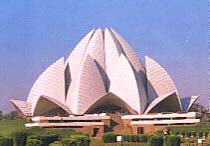Baha'i origins
 |
 |
 |
Baha’i House of Worship, New Delhi, India |
The Baha’i faith is the youngest of the world's independent religions. Its founder, Baha’u’llah (1817-1892), is regarded by Baha’is as the most recent in the line of Messengers of God that includes Abraham, Moses, Buddha, Zoroaster, Christ and Muhammad.
The central theme of Baha’u’llah’s message is that humanity is one single race and that the day has come for its unification in one global society. God, Baha’u’llah said, has set in motion historical forces that are breaking down traditional barriers of race, class, creed, and nation and that will, in time, give birth to a universal civilization. The principal challenge facing the peoples of the earth is to accept the fact of their oneness and to assist the processes of unification.
The Spread of Baha’i
The Baha’i faith grew out of Islam, but is entirely independent of its parent religion. It first appeared in Persia, then spread to neighbouring Muslim lands in the Ottoman and Russian Empires and to northern India. Though some early followers were of Jewish, Christian, or Zoroastrian background, the vast majority had been followers of Islam.
The forerunner of the Baha’i faith was an Iranian named Siyyid Kazim-i-Rashti, known as the ‘Bab’. The title Bab means ‘gate’ and originated among early Shi’a Muslims as a name for the spokesmen of the 12th Imam following the Prophet Muhammed. In 1844 the Bab taught that he was the gate through which a Promised One would soon appear as messenger from God.
To Islamic clergy the Bab and his followers were heretics, because they believed in the coming of further prophets. They were persecuted, and the Bab was executed in 1850. His follower Baha’u’llah was exiled to Baghdad, where he proclaimed himself as the expected messenger of God in 1863. From there he was removed eventually to Acre, in present-day Israel, arriving as a prisoner in 1868. He remained here under house arrest until his death in in 1892. His teachings had already spread beyond the Middle East, and his shrine in Bahja is today the focal point of the Baha’i world community.
|

